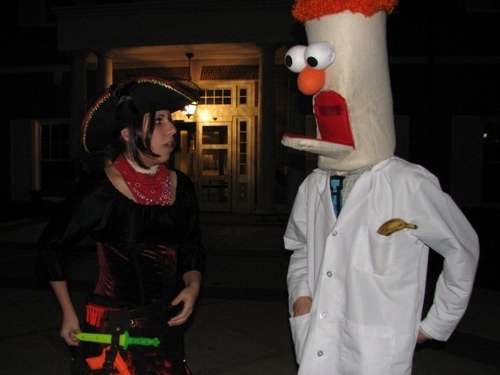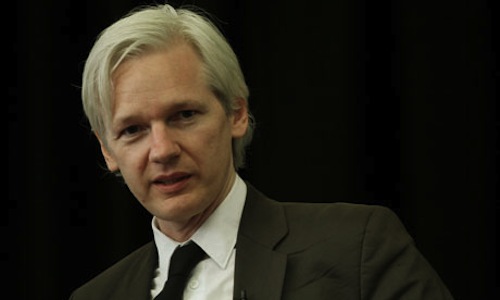Wikileaks, the activist journalism/espionage organization run by creepy weirdo Julian Assange, has offered a $100,000 bounty for text of the Trans-Pacific Partnership trade deal. I checked my computer, and I don’t have the .pdf. It turns out the terms of the Trans-Pacific Partnership are secret. Details of the 12-nation agreement—reputed to restrict the sale of generic pharmaceuticals, constrain fair use of copyrighted materials, and created an international trade court where corporations can sue national governments—are secret. None of that stuff I just listed is necessarily true. Right now, the text of the TPP is available to members of Congress, who can read the treaty in a special room but are not allowed to discuss its contents publicly. Representatives of about 600 private companies can also access the document via a secret internet portal. The general public cannot.
Tag Archives: wikileaks
Wikipedia to go dark in protest of SOPA
Wikipedia, the massive online library of free papers for freshman rhetoric, will go dark on Wednesday in protest of the Stop Online Piracy Act. The act, currently pending in the House of Representatives, would allow the justice department to shut down websites accused of posting copyrighted content and/or block access to those sites via US internet providers. That doesn’t seem so bad, until you consider that much of the content on many of the most popular websites is user-generated—which is to say movie- and TV-generated and, you know, stolen. Sony Pictures could get the Justice Department to shut down YouTube, if it wanted, because people posted videos of Spider Man. And that’s to say nothing of copyrighted Facebook avatars, copyrighted samples, copyrighted Evanescence lyrics on strippers’ blogs, and copyrighted information.
Friday links! Confront the masquerade edition
 It’s Friday, but more importantly we stand on the cusp of Halloween weekend. I don’t know about you, but I like Halloween. It’s a holiday we can all celebrate comfortably. Halloween doesn’t come with the weirdo baggage of a Christmas or a Columbus Day; it’s a perfectly innocent time devoted to images of death, elision of individual identity and the sexualization of pirates. The best part of Halloween is, of course, the masquerade. For one night of the year and maybe the preceding Saturday, the social conventions that govern dress and age-appropriate behavior are lifted, and we confront the real freedom we possess. Here is carnival in the root sense of the word—a society governed not by mores but by appetites, mostly for Reese’s and Apple Pucker, but also for truth. Paradoxically, we become most ourselves when we put on a costume. This week’s link roundup is all about the truth that reveals itself only in the lie, the confrontation with the masquerade. Also midget tossing. Trick or treat, kids. Why don’t you reach into this sack without really knowing what’s in it?
It’s Friday, but more importantly we stand on the cusp of Halloween weekend. I don’t know about you, but I like Halloween. It’s a holiday we can all celebrate comfortably. Halloween doesn’t come with the weirdo baggage of a Christmas or a Columbus Day; it’s a perfectly innocent time devoted to images of death, elision of individual identity and the sexualization of pirates. The best part of Halloween is, of course, the masquerade. For one night of the year and maybe the preceding Saturday, the social conventions that govern dress and age-appropriate behavior are lifted, and we confront the real freedom we possess. Here is carnival in the root sense of the word—a society governed not by mores but by appetites, mostly for Reese’s and Apple Pucker, but also for truth. Paradoxically, we become most ourselves when we put on a costume. This week’s link roundup is all about the truth that reveals itself only in the lie, the confrontation with the masquerade. Also midget tossing. Trick or treat, kids. Why don’t you reach into this sack without really knowing what’s in it?
Why isn’t Julian Assange a better person?
For those of us who remain committed, on an ideological if not a practical level, to the notion that the truth can never be immoral, Julian Assange is an increasingly troubling person. When Assange first released his cache of US diplomatic cables to various news outlets, Combat! blog took the position that Wikileaks is awesome. It got us into a lot of spirited discussions—viz. “Is That Journalism?” at Flippers and the extremely treacherous “Is That Rape?” at Mom’s kitchen table—that emphasized the enormous gap between theoretical and actual applications of the Truth. The Truth exists as a sort of disembodied ideal in our heads, but it goes out into the world in the company of people and events. As this excellent narrative of the people and events surrounding the Wikileaks disclosures suggests,* the Truth is frustratingly inseparable from the person telling it. The more we learn about Julian Assange’s truth-telling, the more his project seems to be about the telling rather than the truth. That’s a shame, since it seems to be what the powers that Assange set out to embarrass wanted in the first place.
the Truth is frustratingly inseparable from the person telling it. The more we learn about Julian Assange’s truth-telling, the more his project seems to be about the telling rather than the truth. That’s a shame, since it seems to be what the powers that Assange set out to embarrass wanted in the first place.
You don’t need totalitarian government when you’ve got MasterCard
The sentence “Julian Assange has not yet been charged with a crime,” became a problematic way to discuss Wikileaks a few months ago, when Swedish authorities accused him of rape. So Julian Assange has not been charged with espionage or—as one Fox News reporter suggested, in apparent ignorance of his Australian citizenship—treason. Instead, he is the object of extradition proceedings for failing to stop what began as consensual sex when his condom broke. Meanwhile, in the same treason interview, Joe Lieberman suggested that the New York Times be investigated for publishing Assange’s leak of diplomatic cables. An “investigative” phone call from the senator’s office already prompted Amazon to stop hosting his website, and MasterCard and Visa prohibited donations to WikiLeaks last week. While the US government decides whether what he did was spying or journalism, his website has been shut down, his income stream has been frozen, and Julian Assange has been put in jail. But he hasn’t been censored.




